Qin Team (Pediatric Dentistry)
Our long-term goals focus on 1) The oral microenvironment and microbiome in children during caries development, and their relationship with caries mechanisms across different stages of growth and development; 2) Genetic and molecular basis of monogenic dental and orofacial disorders.
Dental caries is the primary disease threatening the oral health of children in China, with its etiology closely related to the dysbiosis of oral microenvironment and oral microbiome. As a pediatric dental team, one of our key research projects is dedicated to the variation in the oral microenvironment throughout the onset, treatment, and recurrence of dental caries, and identifying the physiological characteristics of the oral microbiome during various stages of children's growth and development.
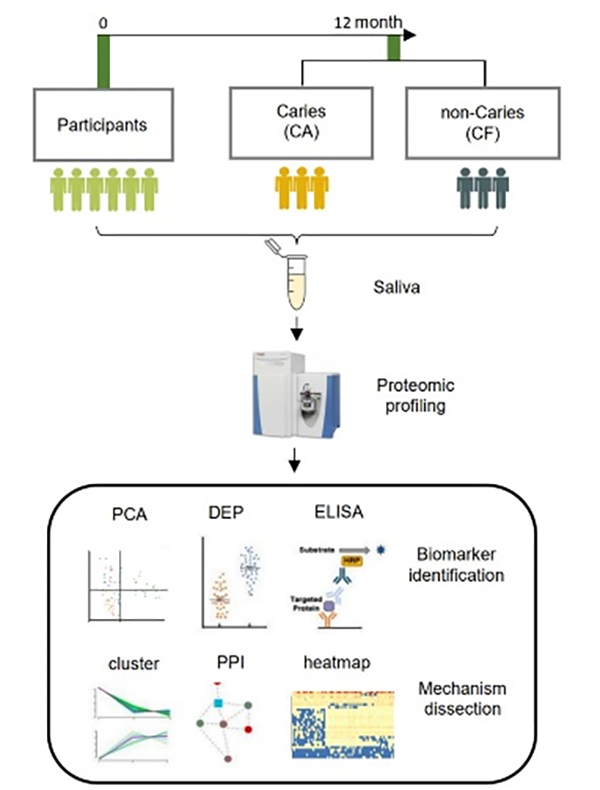
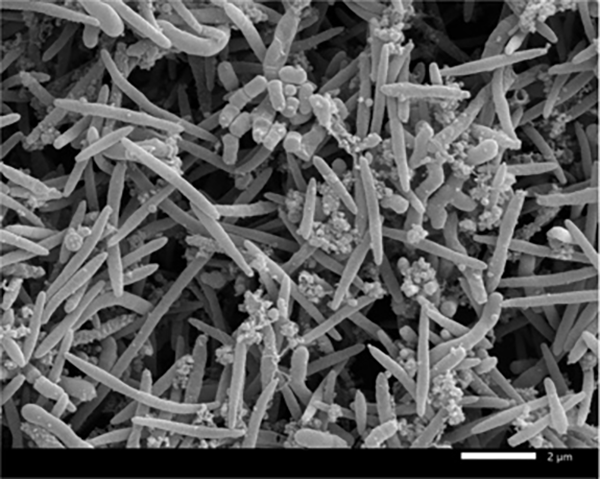
Besides, we also interested in Saccharibacteria (TM7), a group of ultra-small bacteria with reduced genomes and restricted metabolic capacities in the human oral cavity, and currently focus on its metabolic activities relationships with periodontitis.
Our team is also committed to uncovering the genetic and molecular mechanisms underlying tooth development and its disruption in both syndromic and non-syndromic conditions. Through an integrated approach that combines clinical diagnostics, genomics, molecular biology, and advanced imaging, we aim to elucidate how specific gene variants contribute to various hereditary disorders, including Amelogenesis Imperfecta, Axenfeld-Rieger Syndrome, Junctional Epidermolysis Bullosa, and Dentin Dysplasia.
DIRECTOR

Man Qin, DDS, PhD
Professor
Principal Investigator
qinman@pkuss.bjmu.edu.cn
As a principal investigator, Dr. Qin has received research funding from the National Natural Science Foundation of China (NSFC) and the Capital Clinical Characteristics Applied Research Projects for studies on the metabolic variation of the oral microbiome during caries development and its relationship with caries mechanisms. She has also secured multiple grants for projects focused on the implementation and expansion of guidelines for the prevention and appropriate clinical treatment of severe early childhood caries. Currently, her work is supported by Capital’s Funds for Health Improvement and Research, focusing on CAD/CAM one-piece glass fiber post-and-core crown restorations for significant coronal tooth defects in adolescents’ anterior teeth.
Dr. Qin served as the President of the Pediatric Dentistry Association of Asia (PDAA) from 2022 to 2024 and the Chinese Society of Pediatric Dentistry (CSPD) from 2018 to 2020. She was also a Member of the Membership Committee (2014–2019) and a Council Member of the International Association of Pediatric Dentistry (IAPD). She currently serves as Vice President of the Chinese Society of Laser Dentistry.
RESEARCH AREAS
Variation of oral microbiome during caries development and its relationship with caries mechanism
Our research team is dedicated to investigating the physiological characteristics of the oral microbiome during various stages of children's growth and development, as well as the variation in the oral microenvironment throughout the onset, treatment, recurrence of dental caries, and identifying the microbial relationship of carious primary molars and adjacent first permanent molars. We also aim to identify microbial biomarkers associated with the incidence of dental caries and salivary biomarkers related to host characteristics, with the ultimate goal of achieving precise prevention of dental caries.
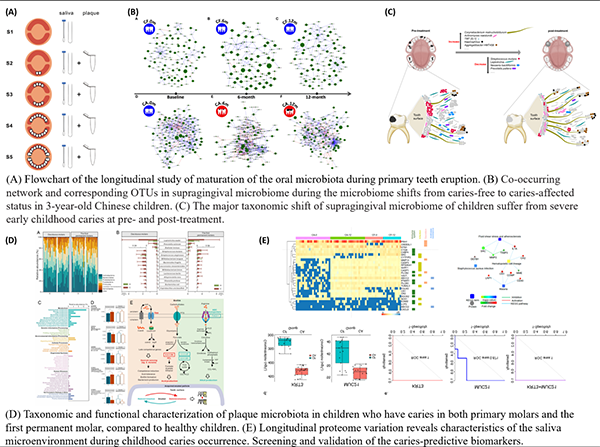
Saccharibacteria (TM7) in the human oral cavity
TM7 are ubiquitous members of the human oral microbiome which lives on the surface of their host bacteria as obligate epibionts and belongs to Candidate Phyla Radiation (CPR), a group of ultra-small bacteria with reduced genomes and restricted metabolic capacities. An increase in the relative abundance of TM7 was detected in patients with periodontitis. However, causal research to investigate their role in periodontitis is lacking due to their recalcitrance to cultivation. Our previous study found TM7 acquired arginine deiminase system (ADS) during transition from environment to mammals. Using the first coisolated representative, TM7x and their host Schaalia odontolytica strain XH001 (He, et al. 2015, PNAS) as a model sysytem, we found TM7x obtain Adenosine triphosphate (ATP) and ammonia via ADS, and their infectivity and resistance to acid environment in oral cavity are all increased. Our group currently focus on the metabolic activities of TM7 and its relationships with periodontitis.
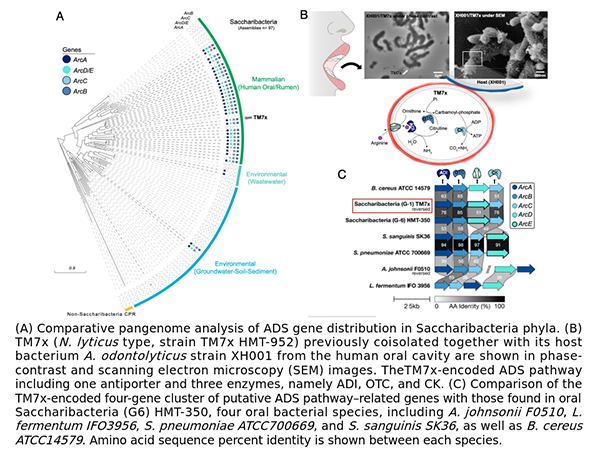
Genetic and molecular basis of monogenic dental and orofacial disorders
Accurate molecular diagnosis is critical for the diagnosis, treatment, prognosis, and prevention of hereditary oral diseases. Our research group has compiled a cohort of pedigrees from patients with inherited dental and orofacial disorders. In our earlier studies, we identified and validated over 20 novel pathogenic variants associated with conditions such as amelogenesis imperfecta, dentinogenesis imperfecta, and hypophosphatasia. Notably, some mutations were located in non-coding regions and thus undetectable by conventional whole-exome sequencing--for example, variants in the 5’ untranslated region of the LAMB3 gene that impact gene structure and function.
We have also conducted functional studies to elucidate disease mechanisms. One such investigation demonstrated how PITX2 knockdown affects ameloblast proliferation and differentiation by altering key signaling pathways. Currently, our team is working to identify new pathogenic genes linked to hereditary oral diseases. A major focus is the ODAM gene, which we suspect plays an etiological role in enamel development.
(A) Family Pedigree and Clinical Features of the proband. (B) Mutational analysis of the family and the ODAM variant (c.17T>C, p.L6P). (C) Intracellular localization and western blot of cells transfected with vectors expressing wild-type and mutant ODAM. (D) Micro-CT and SEM analysis of teeth from the healthy control and the proband
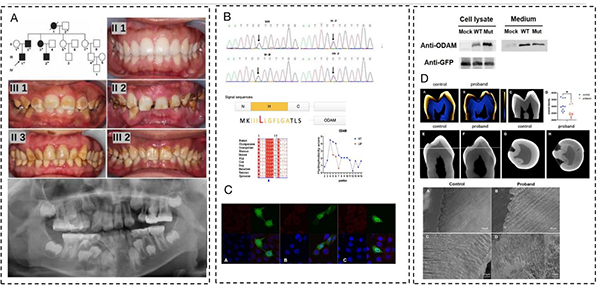
RECENT PUBLICATIONS
Acquisition of the arginine deiminase system benefits epiparasitic Saccharibacteria and their host bacteria in a mammalian niche environment
Proceedings of the National Academy of Sciences, January 2022
The Subgingival Microbial Composition in Health and Periodontitis with Different Probing Depths
Microorganisms, April 2025
Oral Microbiome Shifts from Caries-Free to Caries-Affected Status in 3-Year-Old Chinese Children: A Longitudinal Study.
Frontiers in Microbiology, August 2018
Maturation of the oral microbiota during primary teeth eruption: a longitudinal, preliminary study.
Journal of Oral Microbiology, March 2022
Differences in Sole Carbon Source Utilization of the Dental Plaque Microbiota Between Caries-Free and Caries-Affected Children
Frontiers in Microbiology, March 2020
Microbial Relationship of Carious Deciduous Molars and Adjacent First Permanent Molars.
Microorganisms. September 2023
Deep Saliva Proteomics Elucidating the Pathogenesis of Early Childhood Caries and Identifying Biomarkers for Early Prediction.
Journal of Proteome Research, February 2025
The short-term impact of comprehensive caries treatment on the supragingival microbiome of severe early childhood caries
International Journal of Paediatric Dentistry, January 2024
Digenic inheritance accounts for phenotypic variability in amelogenesis imperfecta.
Clinical genetics, March 2024
An intronic variant in LAMB3 contributes to junctional epidermolysis bullosa and enamel hypoplasia via translational attenuation.
Archives of oral biology, January 2025
Expression Patterns of Claudin Family Members During Tooth Development and the Role of Claudin-10 (Cldn10) in Cytodifferentiation of Stratum Intermedium.
Front Cell Dev Biol, October 2020
Enamel defects of Axenfeld-Rieger syndrome and the role of PITX2 in its pathogenesis.
Oral diseases, November 2023
A novel 4q25 microdeletion encompassing PITX2 associated with Rieger syndrome.
Oral diseases, October 2018
Novel FAM83H mutations in patients with amelogenesis imperfecta.
Sci Rep, July 2017
TEAM

Jing Tian, DDS
Staff Researcher
jtian@pkuss.bjmu.edu.cn

Xu He, MD
Staff Researcher
kqxuhe2004@pku.edu.cn

Xin Wang
Staff Researcher
pkusswangxin@bjmu.edu.cn

Yi Yang
Staff Researcher
pedo_yy@pku.edu.cn
CONTACT
Man Qin
qinman@pkuss.bjmu.edu.com
Peking University School and Hospital of Stomatology,
No.22 Zhongguancun South Avenue,
Haidian District, Beijing 100081, PR China
last text: Yuming Zhao Lab
next text: Shuguo Zheng Lab (Preventive Dentistry)






